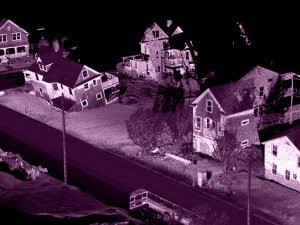The Coastal Universities Coalition is a consortium of the nation’s leading academic institutions convened to develop science-based solutions to the most pressing issues facing populated coastal regions. This month, a CAIT researcher was invited by the organization to speak on infrastructure resilience during a visit to Capitol Hill.
On Friday, February 14, representatives from universities nationwide were invited to Capitol Hill to take part in a roundtable discussion and provide expertise to policy makers on infrastructure resilience issues. Rutgers Center for Advanced Infrastructure and Transportation (CAIT) was among them.
Dr. Jie Gong, associate professor of civil and environmental engineering and a CAIT-affiliated researcher, was invited to participate by the Coastal Universities Coalition (CUC). He said the discussions were important to have and served as an opportunity to share information and expert perspectives on coastal resilience.
Topics such as reducing the costs of recovery and resilience, the coastal workforce, nature-based infrastructure, and more were of interest to the audience. Dr. Gong said that specific bills relevant to infrastructure resilience were discussed too.
“Coastal cities are particularly vulnerable to severe weather,” Dr. Gong said. “Over many decades they have evolved into highly concentrated, complex infrastructure and building systems that are challenged by fluctuating demographics and literally shifting environments. Research to make them more resilient, sustainable, productive, and equitable is critically important.”
The event began with a brief introduction of the CUC, followed by short introductions of each expert and their background. In the audience were staffers from coastal districts throughout the country, relevant committees, or environmentally focused caucuses who participated by asking questions and discussing pressing legislation with the panel of experts.
Some of Dr. Gong’s recent research has concentrated on using remote sensing to gather geospatial big data and applying sophisticated data analytics to understand building and infrastructure performances in the context of natural disasters. Technology and methods emerging from this sort of research can support rapid response, debris removal, and recovery management.

Lidar scan of houses damaged from Hurricane Sandy.
In the past 10 years, Dr. Gong has led post-disaster reconnaissance missions during Hurricane Sandy, Hurricane Harvey, and Hurricane Michael with the goal of advancing post-disaster damage assessment methods and turning disaster data into actionable knowledge for resilient rebuilding. During the roundtable discussion, Dr. Gong provided his suggestions on building better baseline data sets to support damage assessment and modeling and wind risk reduction. In particular, he emphasized the need of protecting the coastal communities from multi-hazards.
As a consortium, CUC leverages academic resources to help develop and promote science-based solutions to the most pressing issues facing populated coastal regions. The goal being to inform public policy and create coastal communities that are more sustainable and resilient.
Dr. Gong said the roundtable did just that: presented coastal resilience experts as a direct resource to policy makers and staffers to help inform them and develop science-based solutions for their coastal regions.
“Every region is different, and coastal communities are especially unique and complex,” Dr. Gong said. “Bringing together a diverse range of researchers for this roundtable was important because it allowed for different perspectives and resources to be shared that will hopefully help lead to improved coastal resilience.”

